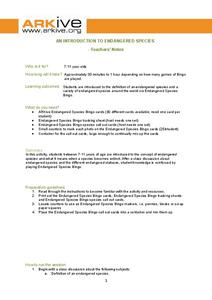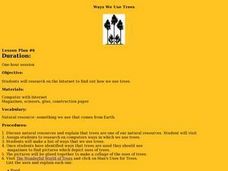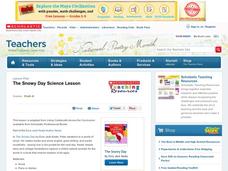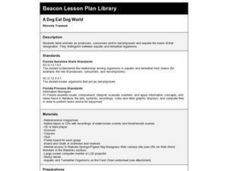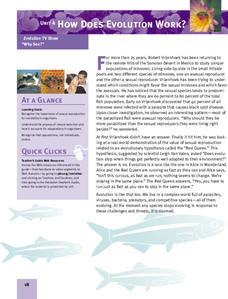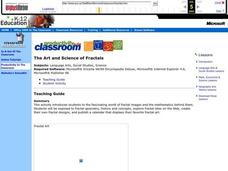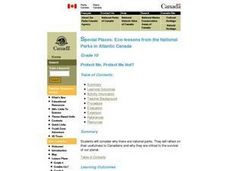Curated OER
Looking at Landforms-Based on the Washington Quarter Reverse
Young scholars use a Washington State Quarter to examine different landforms and discuss natural resources. After a class discussion on the items found on a Washington State quarter, students brainstorm a list of natural resources found...
Curated OER
Emily Dickinson & Poetic Imagination: "Leap, plashless"
Students analyze the poems of Emily Dickinson and write their own nature poem. In this poetry analysis lesson, students read Dickinson poetry and analyze the use of imagery, sound, and metaphor. Students write their own nature poem using...
Curated OER
Wild Wonderful Walk
Students explore the outdoors. In this poetry instructional activity, students spend time outdoors and write a poem about what they felt and saw. Students can do this activity in pairs or alone. Students blindfold their partner to focus...
Curated OER
Wonderful World of Bats
Students create a book about bats. They write a letter to a scientist containing questions about bats. They compare the socialization of bats to humans; compare the needs of bats to humans and other animals.
Curated OER
Strange Winter Weather Affects Nature, People
Young scholars react to a series of statements about the weather, then read a news article about the affect of unusual winter weather on people and animals. In this meteorology and current events activity, the teacher introduces an...
American Museum of Natural History
Theodore Roosevelt's Outdoor Adventures
Time for a virtual sightseeing trip. Pupils explore the Grand Canyon, Devil's Tower, and Yosemite Valley in an interactive online experience. They answer questions about the organisms in each location and draw conclusions based on their...
Curated OER
Teaching With Pourquoi Tales
Students read and discuss several Pourquoi tales--legends that explain why certain natural events occur. They complete a variety of activities surrounding each tale and then write their own Pourquoi tale.
Curated OER
La Belle Époque [1871-1914]:
Progress through various aspects of the "The Beautiful Era" in this presentation. Political, technological, and scientific contexts surround the time of innovation and change in the world landscape. The short length of this slide...
ARKive
An Introduction to Endangered Species
Playing games is a wonderful way to practice skills, start a discussion, or build memory. First, the class discusses extinction and conservation, and then they play a game of bingo. The game cards are printable and include images of...
Curated OER
Ways We Use Trees
Students use the Internet to find the ways we use trees. In this tree lesson, students make a list of the uses of trees and find magazine pictures that show these uses to make a collage. They read The Giving Tree by Shel...
Curated OER
The Snowy Day Science Lesson
Students listen to the story The Snowy Day by Ezra Jack Keats in order to become interested in the world of snow. In this snow exploration lesson, students scoop up snow to make snowballs, measuring the amount of snow they use so each...
Curated OER
Molly's Pilgrim
Third graders explore the multi-ethnic nature of America's citizens and examine the symbolism of the Statue of Liberty. In this Molly's Pilgrim instructional activity, 3rd graders discuss the poem "The New Colossus," examine...
Curated OER
A Dog Eat Dog World
Fourth graders distinguish between acquatic and terrestrial organisms. They label animals as producers, consumers, and/or decomposers.
Curated OER
DRASING NATURE
Young scholars take samples of local trees and identify the tree using a field guide. They keep data for the tree on the Tree ID sheet. They create leaf, seed, bark, and flower prints and paint them.
Curated OER
Marshland Wonders
Students review the characteristics of wetlands and list their benefits. After viewing short videos, they identify the organims that make their home in wetlands and how they have adapted. They compare and contrast the characteristics...
Curated OER
Science Charades
Students dramatize the wonderful world of nature, without making a sound. In this early childhood creative thinking lesson, students dramatize different aspects of nature to develop creative thinking, reading, memory, and motor skills.
Curated OER
How Does Evolution Work?
Learners are introduced to how the process of evolution works. As a class, they review the characteristics of natural selection and how those with advantageous traits reproduce and survive. To test this theory of natural selection,...
Curated OER
Seeds! What is Inside; How does it Grow and Why is it Important?
Students discover the importance of seeds in relationship to nature. In this plant growth lesson plan, students create a collection of seeds and discover the best type of environment to plant them. Students plant their own...
Curated OER
Molly's Pilgrim
Third graders recognize and discuss multi-ethnic nature of America's citizens through a variety of activities.
Curated OER
OUT OF THIS WORLD AND INTO OUR CLASSROOM
Students create projects on Astronomy using math concepts and use of Internet resources.
Curated OER
Using a Thermometer
First graders use their senses to formulate questions and make predictions to determine what is in the "Wonder Bag". They hold pieces of ice and examine while listing descriptors on a chart and then take their own temperature using an...
Curated OER
The Art and Science of Fractals
Students explore the world of fractal images and the mathematics behind them. They explore fractal sites on the Internet. They create their own fractal designs. They publish a calendar displaying their favorite fractal art.
Curated OER
After We Die: Personal Search
In this religious discussion worksheet, students are asked to discuss their thoughts about Bible passages dealing with heaven and judgment. Students discuss ten questions.
Curated OER
Protect Me, Protect Me Not?
Pupils brainstorm natural resources found in Canadian National Parks. They, in teams, defend and support conservation efforts and give a presentation. Evaluation consists of speaking on both pro and con sides of a national parks' issue.



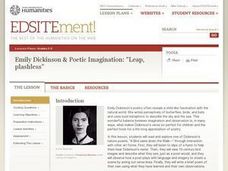

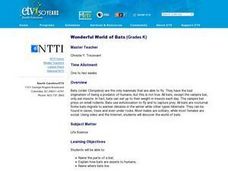
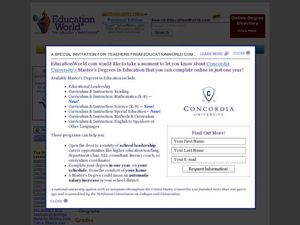


![La Belle Époque [1871-1914]: PPT La Belle Époque [1871-1914]: PPT](http://content.lessonplanet.com/resources/thumbnails/292406/large/cgrmlwnvbnzlcnqymdeymtewoc0zmdqxni1ncdjpenquanbn.jpg?1414487063)
